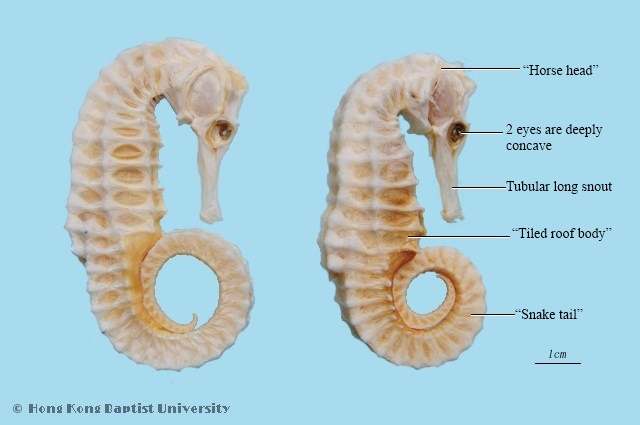Production RegionsPrimarily produced along the coastline of Guangdong, Fujian and Taiwan.
Macroscopic FeaturesHippocampus kelloggi Jordan et Snyder: flat and long, curved, about 30cm long. Externally yellowish-white. Head is slightly similar to horse’s head, with crown-like bulging, with tubular long snout; small mouth, without teeth, two eyes are deeply concave. Body is seven-prism shape; tail is four-prism shape, gradually curved; body has tiled roof-like node lines and short thorns. Light, bone-like, hard texture; slightly fishy odor; slightly salty taste. Hippocampus histrix Kaup: About 15~20cm long; head and body have thin and pointy thorns at the internodes. Hippocampus kuda Bleeker: About 20~30cm long, black-brown. Hippocampus trimaculatus Leach: Short thorn of the 1,4 and 7 th nodes of side back of body have one black spot. Hippocampus japonicus Kaup: small, 7~10cm long, black-brown; relatively thin and small short thorns.
Quality RequirementsSuperior medicinal material is large, firm, with intact head to tail.
FunctionsWarms kidney, invigorates yang, disperses binds, reduces swelling. Apply to impotence, enuresis, panting due to kidney deficiency, abdominal mass accumulation, traumatic injury, externally used to abscess, furuncle and sore.
Technical Terms‘Horse head’: this refers to the head of medicinal material Hai ma looks slightly like a horse’s head. ‘Tiled roof body’: this refers to the body of medicinal material Hai ma has longitudinal ridges and the segmented line and short spines create a shape similar to a tiled roof. ‘Snake tail’: the tail of medicinal material Hai ma is gradually thin and rolls inward, just like the tail of snake.
OriginThe dried body of Hippocampus kelloggi Jordan et Snyder, Hippocampus histrix Kaup, Hippocampus kuda Bleeker, Hippocampus trimaculatus Leach, or Hippocampus japonicus Kaup. (Synganathidae).
